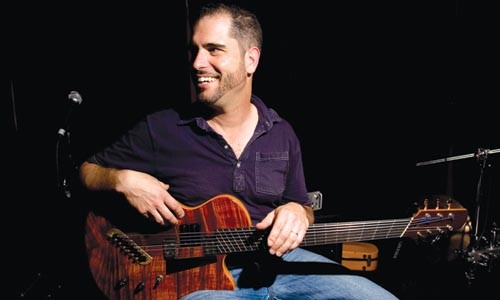You could say that Charlie Hunter's 7-string bass/guitar is a gimmick, but it's really more emblematic of Hunter's go-your-own-way aesthetic. Over the last 17 years, he's released some two dozen albums between solo and collaborative projects, developing his own sound that extends far beyond his unusual instrument. Hunter's played in Disposable Heroes of Hiphoprisy with Michael Franti, covered Nirvana on a solo album and re-recorded Bob Marley's Natty Dread track for track, as instrumental jazz. Throughout it all, his tastes are felicitous, and his playing has a particular vibrancy.
"I was a street musician," Hunter says. "That was my school, so culturally it was very different.
"I was trying to survive and make a living, but I think that a majority of people my age and younger who play 'jazz' come from that whole jazz-school route and the music is very informed by that," he says. "I don't hear any visceral feeling in that music or connection to anything, generally, outside of the scholastic and intellectual. ... For some people that really moves them, but for me it doesn't."
While Hunter's not a trained jazz guitarist, he did take classes from Joe Satriani in his youth. As a teen he could regularly be found at Ruthie's Inn, which not only helped midwife the '80s Bay Area punk scene for bands like the Dead Kennedys and MDC, but also hosted artists like Bobby Bland and Koko Taylor the other half of the week. Jazz artists like Joe Pass and Tuck Andress demonstrated the ability to sound like more than one player at once. Hunter thought he'd do it by melding a bass to an electric guitar in a custom rig.
Picking bass notes with his right thumb, guitar notes with the other fingers and fretting two different positions with his left hand, Hunter honed his style of play. Slowly. Everyone told him he was crazy, and bandmates would sometimes kvetch that they needed to get a bass player. But he got better, much better, and over time Hunter's playing has evolved "away from any specific bass or guitar kind of duties and developed its own kind of thing." (For a long while he played with eight strings before dropping one to better accommodate his hand size.)
While obviously deeply informed by jazz, Hunter's albums explore a broad palette of stylistic colors. The lineups change periodically -- he's led a quintet, and until recently a trio with drum and keyboards. His latest lineup is a quartet with drums, trumpet and sax, a combo Hunter suggests is particularly suited to the music he's been playing lately, which he describes as "pre-soul."
"The music I'm working on is more kind of guitar-centric in that it is coming from that guitar kind of vernacular -- almost like guitar instrumentals, R&B kind of free or avant-soul," Hunter says. "I don't know what it is, but it's not your basic jazz. For me it's all about playing a groove and whatever gestures work over it to make it creative."
He's supporting his October release, Baboon Strength, which features nine instrumentals ranging from the vaguely Squeeze-sounding "Difford-Tillbrook" to the reflective, slow-strutting "A Song for Karen Carpenter" and the title track's organ-driven, spacey rockabilly swing. After years on labels like Blue Note, Thirsty Ear and Ropeadope, it's the first album Hunter has released himself, and he's particularly pleased with the experience.
"It's a lot less of a headache doing it this way than having a record company," Hunter says. While he may sell fewer records, he's only looking to break even, and thanks to the Internet, overhead's a lot lower these days. With a label, he says, "You never really made money off the records, guys in my position. I put the record out because it's a way to focus your thoughts on a concept. So the record comes out and it's really more for touring, and not the other way around."
Hunter admits his odd instrument and playing style probably made things "unnecessarily difficult," but they fit his idiosyncratic personality. If he could go back in time, he says, he wouldn't change, but simply offer himself some encouragement: "I would tell [myself] to just keep at it. Everyone you know is going to be able to play much better than you, much faster than you, and you're going to feel left out and bad. But just keep at it because it will be really fun eventually."
An Evening with Charlie Hunter, featuring drummer Eric Kalb. 7 p.m. Sat., April 4 (doors at 6 p.m.). Club Café, 56-58 S. 12th St., South Side. $15. 412-431-4950 or www.clubcafelive.com














